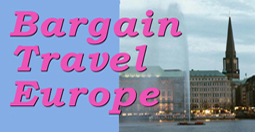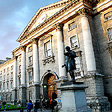DUBLIN CITY HALL
Story of Ireland’s Capital
 It is one
of the most beautiful examples of Georgian neo-classical architecture
in Ireland,
an edifice of austere, formal symmetry of Greco-Roman columns
and white marble. Dubin’s City Hall was built between 1769 and
1779 by Ireland’s Merchants Guild as the Royal Exchange, paid for
by public lottery funds. After the Act of Union passed in 1800 the economy
of Ireland was reduced to the point that the merchantile exchange was
moribund. The building was bought by the city for office space and officially
renamed as the City Hall in 1852 when the first meeting of the Dublin
City Council was held.
It is one
of the most beautiful examples of Georgian neo-classical architecture
in Ireland,
an edifice of austere, formal symmetry of Greco-Roman columns
and white marble. Dubin’s City Hall was built between 1769 and
1779 by Ireland’s Merchants Guild as the Royal Exchange, paid for
by public lottery funds. After the Act of Union passed in 1800 the economy
of Ireland was reduced to the point that the merchantile exchange was
moribund. The building was bought by the city for office space and officially
renamed as the City Hall in 1852 when the first meeting of the Dublin
City Council was held.
 The City
Hall served a role in the story of Irish nationalism. The hall
was held by nationalist
insurgents in the Easter Rising of 1916 and was
the temporary office of the Irish Provisional Government of Michael Collins.
The elegant rotunda has seen the funerals of Irish national patriots
Charles Stewart, Jeremiah O’Donovan Rossa, as well as Michael Collins
(see Collins
Barracks). The government offices were moved to newer quarters
in 1995 and the building restored to its original form and opened to
the public in 2000.
The City
Hall served a role in the story of Irish nationalism. The hall
was held by nationalist
insurgents in the Easter Rising of 1916 and was
the temporary office of the Irish Provisional Government of Michael Collins.
The elegant rotunda has seen the funerals of Irish national patriots
Charles Stewart, Jeremiah O’Donovan Rossa, as well as Michael Collins
(see Collins
Barracks). The government offices were moved to newer quarters
in 1995 and the building restored to its original form and opened to
the public in 2000.
 Designed
by architect Thomas Cooley, the City Hall is most noted for is
circular entrance
hall and domed rotunda, surrounded by an ambulatory
with carved Corinthian column capitals, where the merchants strolled
and haggled over the price of goods. The rotunda is host to the statues
of Irish politicians like Daniel O’Connel and Dr Charles Luca dressed
in togas as if Roman senators. On the lower ground floor, an interactive
historical exhibit of “The Story of the Capital” tracing
the story of Dublin from before the Anglo-Norman invasion of 1170 (see Dublinia at Christ Church) up to the present day is presented within
the very striking undercroft vaults of the hall. The exhibit presents
displays of artifacts, the Great Sword and Mace of Dublin and the Lord
Mayor's Chains of Office, and medieval manuscripts, along with interactive
computer interfaces, archive films and models. And check out the story
behind Dublin’s curious Coat of Arms still in use with its three
castles aflame.
Designed
by architect Thomas Cooley, the City Hall is most noted for is
circular entrance
hall and domed rotunda, surrounded by an ambulatory
with carved Corinthian column capitals, where the merchants strolled
and haggled over the price of goods. The rotunda is host to the statues
of Irish politicians like Daniel O’Connel and Dr Charles Luca dressed
in togas as if Roman senators. On the lower ground floor, an interactive
historical exhibit of “The Story of the Capital” tracing
the story of Dublin from before the Anglo-Norman invasion of 1170 (see Dublinia at Christ Church) up to the present day is presented within
the very striking undercroft vaults of the hall. The exhibit presents
displays of artifacts, the Great Sword and Mace of Dublin and the Lord
Mayor's Chains of Office, and medieval manuscripts, along with interactive
computer interfaces, archive films and models. And check out the story
behind Dublin’s curious Coat of Arms still in use with its three
castles aflame.
 The Dublin
City Hall on Dame Street in the city center is probably not a must
see, but it
is very near the Dublin Castle, Christ Church and
Temple Bar (see Temple
Bar Pubs), and worth a short visit, especially
with a Dublin Card on which it is included. Without a pass, adult admission
is €4, childen €1.50 and a family ticket is available for €10.
The City Hall is open from Monday to Saturday 10am to 5:15pm with last
admission an hour before closing. © Bargain
Travel Europe
The Dublin
City Hall on Dame Street in the city center is probably not a must
see, but it
is very near the Dublin Castle, Christ Church and
Temple Bar (see Temple
Bar Pubs), and worth a short visit, especially
with a Dublin Card on which it is included. Without a pass, adult admission
is €4, childen €1.50 and a family ticket is available for €10.
The City Hall is open from Monday to Saturday 10am to 5:15pm with last
admission an hour before closing. © Bargain
Travel Europe
Find best hotel and travel deals in Dublin at TripAdvisor
Web
Info
Visit
Dublin
These articles are copyrighted and the sole property of Bargain Travel Europe and WLPV, LLC. and may not be copied or reprinted without permission.
SEE ALSO:
GUINNESS STOREHOUSE TOUR
BOOK OF KELLS - TRINITY COLLEGE LIBRARY
HOWTH - DUBLIN'S FISHING VILLAGE
IRISH
FERRIES - DUBLIN TO HOLYHEAD


